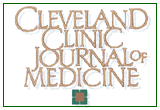


Cleveland
Clinic
Journal
of Medicine
Dedicated
to Lifelong Learning
Editorial
Cancer information and the Internet:
Benefits and Risks
By Maurie Markman, MD
Abstract
The Internet has enormous potential to educate the public about health and medical care, but also can cause tremendous harm through erroneous, misleading, and deceptive information.
Revolution in communication has
occurred over the past several years, as computers and the Internet have
made information on an endless number of subjects quickly available
to the public. Web sites about
health-related topics are growing particularly rapidly, and hospitals,
nonprofit and for-profit medical organizations, and private citizen groups
are using Internet web sites to communicate with large numbers of people.
This exciting new technology has enormous potential to inform and educate the public about health and medical care, but it also has the potential to cause tremendous harm through erroneous, misleading, and deceptive information. Cancer information on the Internet is of particular concern. As patients and the general public increasingly look to the Internet as a source of information on cancer and general health, physicians must familiarize themselves with how the available information may benefit or negatively affect the welfare of their patients.
Benefits of Cancer Information on the Internet
Therapy for a number of common cancers is not highly effective when they are found in advanced stages, and many antineoplastic treatments can produce considerable toxicity. Therefore, patients and their families often seek alternatives to the treatments recommended by their physicians. The Internet quickly and easily provides them with large quantities of information about cancer and its treatment.
Cancer-related web sites
Many cancer-related health organizations
have web sites on the Internet.
Examples include the American Cancer Society (http://www.cancer.org)
and the National Cancer Institute
(http://www.nci.nih.gov).
Information available on these web sites
includes:
• Data on individual physicians: eg, training, specialization, board certification.
• Descriptions of an institution’s focus on cancer: eg, regular multidisciplinary cancer conferences discussing patient management.
By examining the available services and physician qualifications, patients may find it easier to select the most appropriate provider and medical institution when cancer is suspected or documented. If an institution has the capacity to communicate with individuals on-line, the patient can ask about the institution’s experience with a particular type of cancer. In addition, individuals can obtain information about specialized services for a specific tumor type (eg, stereotactic radiosurgery for brain metastasis, bone marrow transplantation for lymphoma) through direct communication with the provider.
Cancer support groups
Cancer support groups on the Internet can inform patients about rational alternative treatments. For example, one support group may inform web site visitors that a particular institution or physician advocates or uses a less aggressive surgical procedure for a specific type of cancer, while another support group may offer helpful hints for dealing with specific toxicities of chemotherapy.
Risks of Cancer Information on the Internet
Unfortunately, the glut of information
on the Internet comes with
major, potentially harmful drawbacks. Of greatest concern
is the complete lack of quality
control for any information or
advice provided. Well-recognized
and highly respected health care
organizations and experts in a particular medical discipline
have no more inherent authority
when viewed on a computer
screen than a misinformed member
of the public attempting to help
others, or than individuals or groups engaged in health
care fraud.
Two recent experiences in my practice provide poignant examples of the potential dangers of obtaining cancer information—and misinformation—via the Internet.
Misinformation
A patient with ovarian cancer came to me for a second opinion regarding treatment options. She was visibly upset. She felt her disease had not been diagnosed at an earlier stage because her gynecologist had "failed" to perform yearly screening tests for ovarian cancer, including vaginal ultrasound and serum CA-125 antigen levels. When I inquired why she thought screening for this disease was part of a regular gynecologic examination, or had been demonstrated to be effective in detecting ovarian cancer at an early stage, she said that her on-line support group provided this information. When I pointed out that, in fact, there is currently no reliable evidence to support routine screening for ovarian cancer,1–3 she seemed quite surprised. "After all," she asked "how can so many people be wrong?"
The answer, of course, is that scientific objectivity has nothing to do with the number of people who claim the information is correct. The shark cartilage cancer-treatment phenomenon is an excellent example of this point.4 Nevertheless, when people continue to repeat incorrect information, the conclusion may take on a life of its own. After all, how can so many people be wrong?
True information, but misleading conclusions
A second, even more troubling example is a man whose wife had been treated for ovarian cancer. Attempting to find the best possible treatment option for his wife, he performed an exhaustive on-line review of the medical literature on second-line chemotherapeutic options for this disease. After examining almost 200 phase-2 (ie, nonrandomized) trials conducted throughout the world over the past several decades, he concluded that more intensive, combined chemotherapy regimens attain higher response rates than single-agent treatment regimens and, therefore, are the best therapeutic option in this situation.
Unfortunately, these conclusions are unjustified and inappropriate. In general, more intensive treatment is reserved for patients in better physical condition, whereas patients in poorer condition receive less intensive, single-agent chemotherapy, because the toxicity of the more intensive strategies cannot be justified in patients with a poor physical status. Further, it has long been known that patients with superior pretherapy clinical characteristics (eg, minimal weight loss, few symptoms, no significant comorbid medical conditions) experience a more favorable outcome independent of specific anticancer therapy.5
The on-line databases this man reviewed are available to anyone with access to the Internet, and the impressive amount of clinical information has an air of authority about it, based on the exhaustive efforts to collect the data from trials conducted over several decades. But only well-designed, well-conducted randomized trials can directly compare the effectiveness of one therapeutic strategy with that of another. Comparing the results of small phase-2 trials performed at multiple institutions, with varying entry criteria, patient populations, and pretherapy prognostic factors, is inappropriate and tends to encourage highly misleading conclusions.5
The proprietor of this web site apparently did not understand this basic principle of clinical investigation, or simply chose to ignore it. As a result, patients, families, and even physicians risk being misinformed, on the basis of the faulty conclusions from comparing the results of nonrandomized clinical studies. Patients with ovarian cancer who visit this web site are likely to request or even demand treatment that is more toxic, but not more effective.
Balancing the good and the bad
The problems with health information
on the Internet are many. For
example, the quantity of information provided and the
technological sophistication of
its presentation bear no
relationship to the quality
of the data and their interpretation. Also,
there is no peer review of the scientific and clinical value
of the vast quantities of on-line
health information, just as there
is no requirement for objectivity
and balance in the presentation of
risks and benefits of cancer treatment options and in claims
about their effectiveness. Furthermore,
seriously ill people, such
as cancer patients, are particularly
vulnerable to unsubstantiated
claims about less toxic therapies and better overall
outcomes.
Ultimately, the balance between
benefit and harm from health information
on the Internet is determined by how individuals choose
to use the data, and by their understanding of the
limitations of this mass communication
tool. Physicians can help their
patients deal with the complexities of this process by
encouraging discussion of the information
obtained from the
Internet and by helping them
to gauge the clinical relevance of the
material in their particular disease.
References
1. Carlson KJ, Skates SJ, Singer
DE. Screening for ovarian cancer. Ann Intern
Med 1994; 121:124–132.
2. Schapira MM, Matchar DB, Young
MJ. The effectiveness of ovarian cancer
screening. Ann Intern Med 1993; 118:838–843.
3. Mackey SE, Creasman WT. Ovarian
cancer screening. J Clin Oncol 1995;
13:783–793.
4. Markman M. Shark cartilage:
the laetrile of the 1990s. Cleve Clin J Med 1996;
63:179–180.
5. Markman M. The importance
of distinguishing "clinical judgement" in cancer
management from "selection bias" in clinical trials. J Cancer Res Clin
Oncol 1996; 122:573–574.
About the Author
Dr. Markman is the Chairman, Department
of Hematology/Medical Oncology;
director, Cleveland Clinic Cancer Center; associate editor,
Cleveland Clinic Journal of Medicine.
Address: Maurie Markman, MD, Department
of Hematology/Medical Oncology,
T40, The Cleveland Clinic Foundation, 9500 Euclid Avenue,
Cleveland, OH 44195.